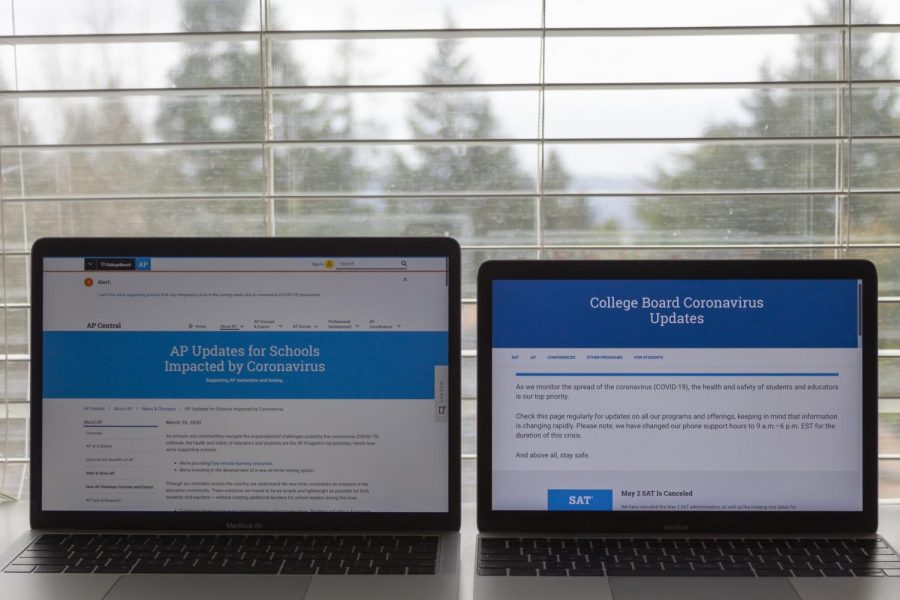COVID-19: What Does It Mean for the College Admissions Process?
As a result of the coronavirus outbreak, the College Board determined that AP tests will be conducted online this year.
April 8, 2020
The coronavirus outbreak has disrupted many aspects of high school life such as closing campus entirely, scrapping spring sport seasons, and cancelling trips such as Moab. For juniors, in particular, many of whom are beginning to prepare for the college admissions process, the pandemic has caused significant uncertainty about this key rite of passage.
The typical admissions process is being deeply disrupted, especially since being in quarantine prevents face to face discussion with counselors, college visits, and in-person test taking.
On Friday, March 20, the College Board announced that AP tests will be completed online this year, rather than in person. While this is something that will impact students across multiple grade levels, many juniors will be taking these exams for the first time.
In an email sent to students the College Board said, “The health and safety of educators and students are the AP Program’s highest priorities.”
In addition to taking AP exams from home, most of the tests have been condensed from 180 minutes to 45, and won’t consist of any multiple choice questions. This will require all answers to be written as short responses. Also, according to the College Board, “The exam will only include topics and skills most AP teachers already covered in class by early March.”
“I think the fact that they are shorter is a little bit rough in terms of kind of being able to show how much you really know,” junior David Jensen said, who will have to take five online AP tests this year. “But then also, since they are shorter… you kind of get it over with and it’s not going to take a huge chunk of time.”
Junior Sophia Donato will be taking an AP test for the first time and shared similar thoughts. “In regards to our current situation with COVID I understand why we’re switching,” she said. “[However,] I think it is kind of a bummer that we’re not taking the normal test because I think that this revised version is going to have some faults.”
Counselor Mr. Seth Altshuler said that he doesn’t think this new method of testing will be equitable for students at all. “I don’t think you’re going to get the best results,” he said. “I don’t think you’re going to get students feeling like they’re ready. I feel like it’s trying to push something through just to get it done when it may not be done well.”
All AP exams will be taken between May 11 and 22; although if this doesn’t work for a student, the College Board is offering make-up test dates between June 1 and 5.
The tests will still be scored using the usual one through five scale.
On top of the changes being made to AP test taking, the SAT that was scheduled to occur on May 2 was cancelled entirely. The next test is currently set to take place on June 6. However, it’s likely that may be cancelled as well, considering a growing number of states have moved to end all in-person activities for the rest of the school year.
As a result of the coronavirus pandemic, many colleges are no longer requiring the class of 2021 to submit test scores alongside their applications. All University of California and California State University schools, for instance, have adopted this idea.
Mr. Altshuler said that “it is possible that this will be a year where the SAT doesn’t matter.”
He believes that if students were to take the SAT three months from now, they wouldn’t be as prepared as they are today or were a few months ago, especially since students aren’t physically present for class or frequently meeting with their teachers.
Eliminating the requirement for standardized test scores, however, leaves some students, such as Donato, feeling unsure, and as if they might be at a disadvantage in comparison to others who do submit their scores.
“Just because it’s optional doesn’t mean it doesn’t matter,” she said, as she plans to take the SAT again when it’s possible.
Jensen, on the other hand, believes that it will be beneficial for some students.
“It’s going to force colleges to look at your applications more,” he said. “For some people, that’s good because not everyone is a good test taker… so when colleges take a look at applications that’s going to show, I think, a broader perspective of whoever is applying.”
While students are practicing social distancing, counselors are encouraging them to study for their AP exams as well as the SAT using different resources such as Khan Academy.
“It’s free [and] it’s well designed,” Mr. Altshuler said. “It can cater to what you struggle with specifically.”
In an email, counselors provided students and parents with information on virtual college tours, since most everyone who planned to visit schools over spring break had to cancel their trips.
“I was planning on visiting colleges during spring break,” Donato said. “I was going to take tours at Claremont McKenna, Pitzer, University of San Francisco, and Santa Clara University. [Though] I do hope to visit these schools eventually.”
The email also included several resources that students and parents can use to stay informed about admission events, deposit dates, and scholarships.
“Please know that your counselors are here to help support you,” the email read.
Despite living in a time of uncertainty and with many unanswered questions, the advice that counselors are providing is to remain composed and patient.
“Stay on top of your work with the DLDs so you don’t have any major slip ups,” Mr. Altshuler said. “Keep your mind active so you’re still in academic mode. And wait and see.”





